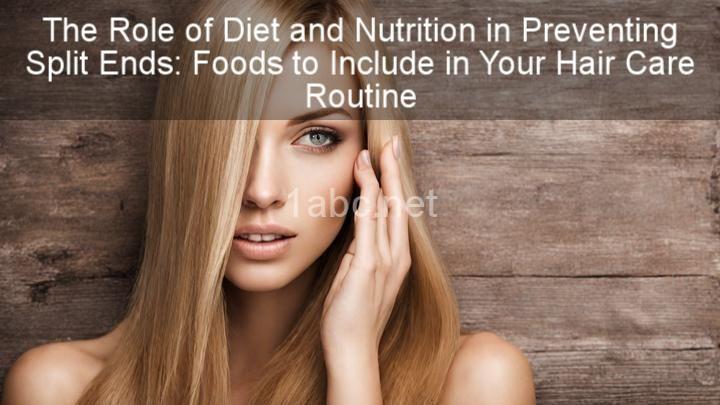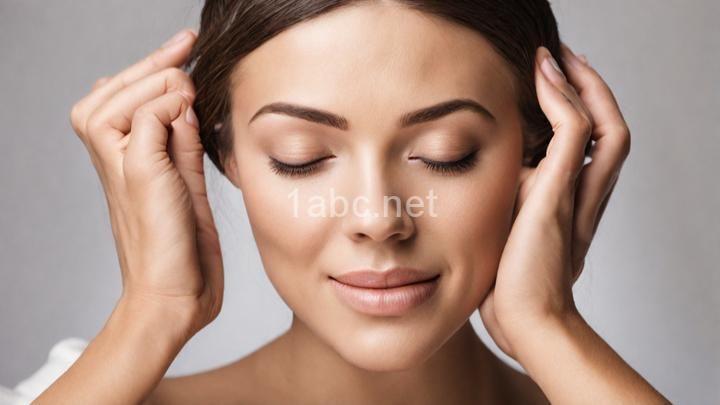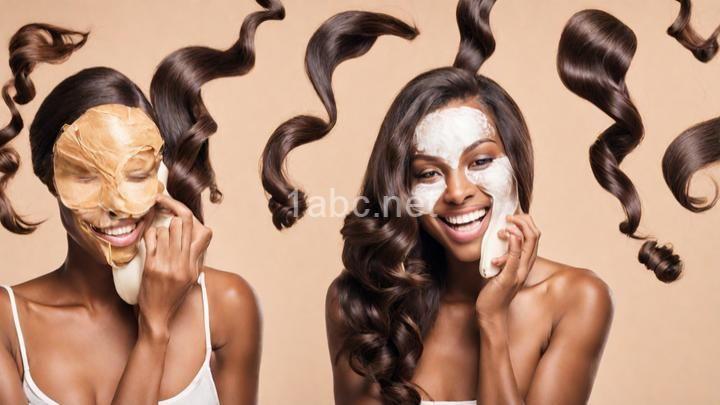The Role of Diet and Nutrition in Preventing Split Ends: Foods to Include in Your Hair Care Routine

Introduction:
Are you tired of dealing with split ends and dull-looking hair? Well, you're not alone. Many of us struggle with maintaining healthy hair, but did you know that your diet and nutrition play a significant role in preventing split ends? Yes, you read that right! What you eat can have a direct impact on the health and appearance of your hair. In this blog post, we will explore the connection between diet and hair health, and provide you with a comprehensive list of foods that you can include in your hair care routine to prevent split ends and promote overall hair health.
Section 1: Understanding Split Ends
Let's start by understanding what split ends are and why they occur. Split ends are the result of damage to the hair shaft, usually caused by excessive heat styling, chemical treatments, and environmental factors such as sun exposure and pollution. When the protective outer layer of the hair, called the cuticle, gets damaged, the hair strands become weak and prone to splitting. Split ends not only make your hair look frizzy and unkempt but also hinder hair growth and overall hair health. That's why it is crucial to focus on prevention rather than just treating split ends after they occur.
Section 2: The Link between Diet and Hair Health
You may be surprised to learn that your diet plays a vital role in maintaining healthy hair. Just like any other part of your body, your hair needs proper nutrition to thrive. Certain nutrients, when consumed in the right amounts, can directly affect the quality, growth, and strength of your hair. Incorporating a balanced diet into your hair care routine is essential for achieving luscious, split end-free locks.
Section 3: Essential Nutrients for Healthy Hair
To prevent split ends and promote overall hair health, it's important to consume foods rich in specific nutrients. Let's take a look at some of these essential nutrients:
- Biotin: Also known as vitamin H, biotin is crucial for maintaining healthy hair. It helps strengthen the hair shaft and promotes hair growth.
- Omega-3 fatty acids: These healthy fats nourish the hair follicles and improve hair density and thickness.
- Vitamin E: This powerful antioxidant protects the hair from oxidative stress and promotes a healthy scalp.
- Iron: Iron deficiency can lead to hair loss and brittleness. Consuming adequate amounts of iron-rich foods is essential for healthy hair growth.
- Zinc: Zinc plays a vital role in hair tissue growth and repair. It helps maintain the oil-secreting glands on the scalp, which keep hair moisturized and prevent split ends.
Section 4: Foods to Include in Your Hair Care Routine
Now that we understand the importance of these essential nutrients, let's explore the foods that are rich in them:
- Biotin-rich foods: Eggs, almonds, avocados, and sweet potatoes are excellent sources of biotin. Including these foods in your diet can help strengthen your hair and prevent split ends.
- Omega-3 fatty acid sources: Salmon, chia seeds, walnuts, and flaxseeds are packed with omega-3 fatty acids. These foods nourish your hair follicles and promote healthy hair growth.
- Vitamin E sources: Spinach, sunflower seeds, broccoli, and olive oil are rich in vitamin E. These foods protect your hair from damage and keep it healthy and shiny.
- Iron-rich foods: Lean meats, lentils, dark leafy greens, and tofu are excellent sources of iron. Consuming these foods ensures that your hair follicles receive adequate oxygen and nutrients, preventing split ends.
- Zinc sources: Oysters, pumpkin seeds, beef, and chickpeas are loaded with zinc. Including these foods in your diet helps maintain a healthy scalp and prevents hair breakage.
Section 5: Incorporating These Foods into Your Daily Diet
Now that you have a list of hair-healthy foods, you may be wondering how to include them in your daily meals. Here are some practical tips:
- Start your day with a biotin-rich breakfast, such as scrambled eggs with avocado slices.
- Snack on a handful of walnuts or almonds to get your omega-3 fatty acids.
- Add spinach and sunflower seeds to your salads for a boost of vitamin E.
- Incorporate iron-rich foods into your main meals, like lentil soup or stir-fried tofu with dark leafy greens.
- Sprinkle pumpkin seeds on top of your yogurt or smoothie for a zinc-rich snack.
Remember, small changes in your diet can make a big difference in the health of your hair. If you have any specific dietary concerns or restrictions, it's always a good idea to consult with a healthcare professional or a registered dietitian for personalized advice.
Conclusion:
In conclusion, maintaining healthy hair and preventing split ends is not just about using the right hair products or following a rigorous hair care routine. It starts from within, with the food you consume. By incorporating foods rich in biotin, omega-3 fatty acids, vitamin E, iron, and zinc, you can nourish your hair from the inside out, promoting healthy hair growth and preventing split ends. Remember, your hair reflects your overall health, so make sure to prioritize a balanced diet and enjoy the benefits of luscious, split end-free locks. Start making those small dietary changes today, and your hair will thank you tomorrow!
FREQUENTLY ASKED QUESTIONS
What is the importance of diet and nutrition in preventing split ends?
A healthy diet and proper nutrition play a crucial role in preventing split ends. Here's why:
- Adequate Protein Intake: Protein is essential for hair strength and elasticity. Consuming enough protein helps repair and strengthen the hair shaft, reducing the likelihood of split ends.
- Essential Fatty Acids: Omega-3 fatty acids, found in fish, nuts, and seeds, help nourish the hair follicles and scalp. These fatty acids help maintain the hair's natural oils, keeping it moisturized and preventing split ends.
- Vitamin E: This vitamin is an antioxidant that helps protect hair from damage caused by free radicals. Foods rich in vitamin E, like almonds, avocados, and sunflower seeds, can help prevent split ends.
- Biotin: Biotin, also known as vitamin B7, contributes to the strength of hair strands and promotes hair growth. Including biotin-rich foods like eggs, nuts, and whole grains in your diet can help minimize split ends.
- Hydration: Drinking enough water is crucial for overall hair health. Proper hydration keeps hair moisturized from the inside out, preventing dryness and breakage that can lead to split ends.
While a healthy diet is important, it's also essential to follow proper hair care practices like minimizing heat styling, using a wide-tooth comb, avoiding harsh chemicals, and regularly trimming your hair to prevent split ends.
Can food really impact the health of our hair?
Yes, the food we eat can have a significant impact on the health of our hair. A well-balanced diet that includes essential nutrients can promote healthy hair growth and prevent hair loss. Proteins, such as those found in lean meat, fish, and legumes, are essential for the production of keratin, the protein that makes up our hair. Foods rich in vitamins A, C, and E, as well as biotin and omega-3 fatty acids, can also contribute to hair health. Additionally, drinking enough water and consuming foods that promote scalp circulation, like berries and leafy greens, can support optimal hair growth.
Which specific foods should be included in a hair care routine to prevent split ends?
Including certain foods in your diet can contribute to healthy hair and help prevent split ends. Here are some specific foods that you can include in your hair care routine:
- Salmon: Rich in omega-3 fatty acids, which promote hair health and prevent dryness and breakage.
- Eggs: Provide protein and biotin, which are essential for hair strength and growth.
- Spinach: Contains iron, folate, and vitamins A and C, which help keep the hair follicles healthy.
- Avocado: Packed with healthy fats, vitamins, and antioxidants that nourish the hair and prevent damage.
- Nuts and seeds: Almonds, walnuts, flaxseeds, and chia seeds are excellent sources of protein, omega-3 fatty acids, and vitamin E, all of which promote hair health.
- Greek yogurt: Contains protein, vitamin B5, and vitamin D, which are beneficial for hair strength and growth.
- Sweet potatoes: Rich in beta-carotene, which is converted to vitamin A in the body and promotes a healthy scalp.
- Blueberries: Loaded with antioxidants that protect hair follicles from damage and support overall scalp health.
- Lentils: Provide protein, iron, zinc, and biotin, all of which are crucial for healthy hair growth.
- Oysters: High in zinc, which helps repair damaged hair and prevent hair loss.
Remember, while these foods can support hair health, it's also important to maintain a well-balanced diet and follow a proper hair care routine that includes regular trimming, minimal heat styling, and gentle handling of your hair.
How do these foods contribute to preventing split ends?
While there is no specific food that can directly prevent split ends, maintaining a balanced diet can contribute to the overall health of your hair. Here are some foods that contain essential nutrients that support hair health:
- Spinach: Packed with iron, folate, and vitamins A and C, spinach promotes scalp health and enhances hair growth.
- Sweet potatoes: Rich in beta-carotene, sweet potatoes convert to vitamin A in the body, aiding in the production of sebum, a natural conditioner for the scalp.
- Eggs: Loaded with protein and biotin, eggs help to strengthen hair strands and prevent brittleness.
- Nuts and seeds: Walnuts, almonds, chia seeds, and flaxseeds are great sources of omega-3 fatty acids, which nourish the hair follicles and promote healthy hair growth.
- Avocados: Packed with healthy fats, avocados moisturize the scalp and provide essential vitamins such as E and B, which contribute to strong and shiny hair.
- Salmon: High in omega-3 fatty acids and vitamin D, salmon supports scalp health, reduces inflammation, and promotes hair growth.
- Greek yogurt: With high protein content, Greek yogurt helps strengthen hair and improve its elasticity.
Remember that while a healthy diet can support hair health, it is equally important to practice good hair care habits and avoid excessive heat styling, chemical treatments, and harsh brushing to prevent split ends.




